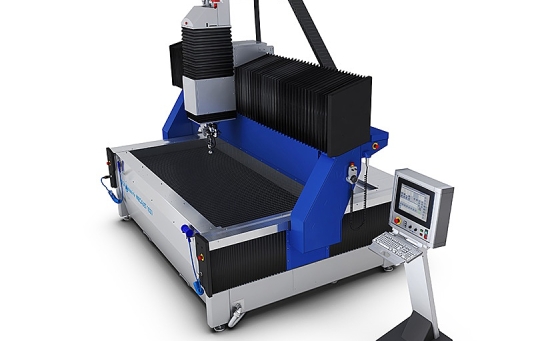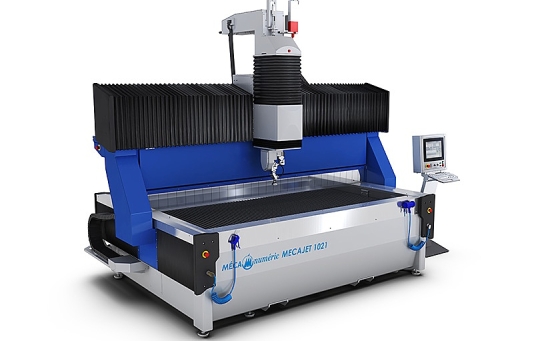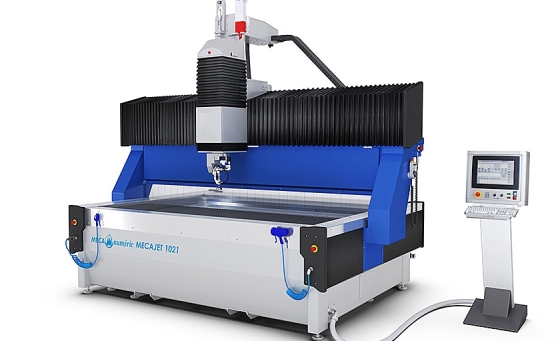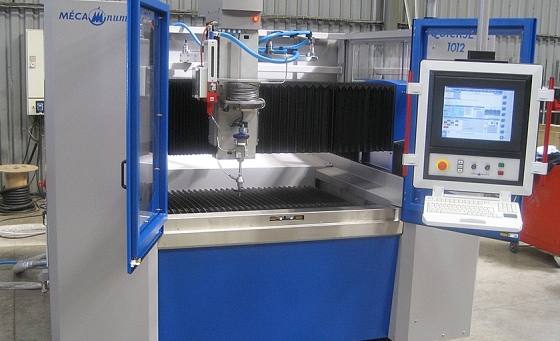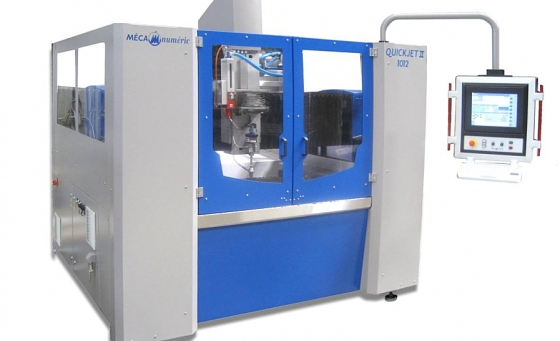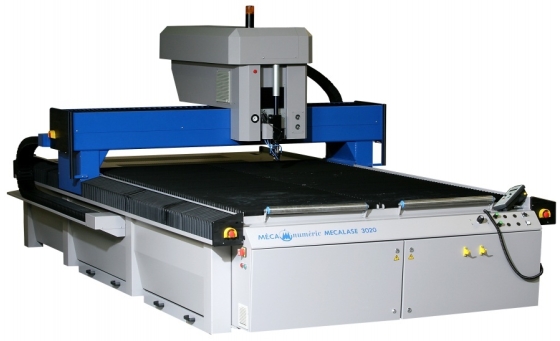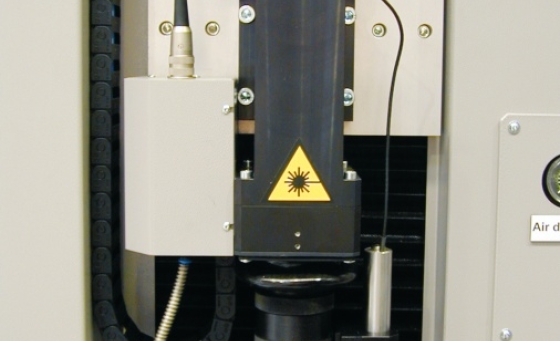Offer and expertise
MÉCANUMÉRIC is a major player in the field of CNC machines, appreciated in various sectors such as industry, dentistry and education. The company is well established in areas such as rapid prototyping, signage, modelling, design and many others. It stands out for its collaborative approach, working closely with its customers to deliver high-quality, integrated solutions. MÉCANUMÉRIC is one of the few manufacturers worldwide with complete expertise in the design, manufacture, installation and maintenance of CNC cutting solutions. These solutions encompass various cutting techniques, including HSM milling, waterjet, laser, knife and ultrasonic.
Global presence and reach
In 2018, the MÉCANUMÉRIC group achieved consolidated sales in excess of €20m and relies on a team of more than 140 professionals with a production area covering more than 13,000 m² in Marssac-Sur-Tarn. Its products are distributed and supported internationally either directly, particularly in the Middle East, Africa and Europe, or through its subsidiaries in Germany, Italy and Russia, or via an extensive network of distributors and partners. The group is dedicated to constant innovation, offering a variety of over 22 ranges of standard equipment, customised technological solutions and an efficient local after-sales service.
Presentation of water jet cutting machines
MECANUMERIC's CNC water jet cutting machines use a high-pressure water jet to cut a variety of materials. This process can use pure water or be mixed with abrasives to cut harder materials. This technology guarantees high precision, even for complex shapes. It offers multiple advantages, including precise cutting, preservation of molecular structure, the ability to cut a variety of materials and low water consumption, all while being environmentally friendly.
How the machine works
To operate, the water is first filtered to remove impurities. Then, depending on the material to be cut, abrasives may be added. The water is then compressed using a special pump, and the jet propelled can reach a speed 2 to 3 times greater than that of sound. This concentrated energy makes it possible to cut almost any material, including those up to 200 mm thick.
Various applications
Water jet cutting is used in a variety of sectors. In the food industry, it allows clean, contamination-free cutting and saves time. For metals, this method is a precise and economical alternative to laser and plasma techniques, with no risk of deformation due to heat. It is also effective for cutting glass, offering precision and versatility. What's more, this technology can be used on a wide range of materials, including alloys, stone, rubber and many others.
The equipment offered by MECANUMERIC
MECANUMERIC offers several ranges of water jet cutting machines. The MECAJET range is ideal for intensive professional use, capable of cutting both soft and hard materials. QUICKJET combines safety, compactness and high precision. LABJET offers precision in a compact format, ideal for industry and training. MDA is specially designed for the food industry, and MDE focuses on pure water cutting, often used in textiles and leather goods.
After-sales support
As well as producing cutting machines, MECANUMERIC also offers a range of consumables and spare parts to keep equipment running smoothly, including abrasives, table liners, nozzles, filters and other essential items.
Introduction to laser cutting
Laser cutting and engraving are distinguished by their high precision, speed of execution and adaptability to a multitude of materials such as aluminium, steel, wood, plastic and many others. The major advantage of this process is that there is no direct contact with the material, guaranteeing optimum safety and absence of deformation. Used in a variety of fields, this technology is just as much at home in the industrial sector, such as aeronautics and furniture, as in more artistic fields, such as decoration and art.
Laser operation
The principle of laser cutting is based on the use of a high-power laser beam that heats the material until it melts or evaporates. Numerical control (CNC) is used to precisely guide the laser beam for optimum results. Technological advances, such as fibre-optic laser technology, further extend the cutting possibilities, making it possible to work on objects of all sizes and formats. What's more, maintenance of the beam is virtually non-existent, making the process economical in terms of consumables.
Various applications
CNC lasers can be used to create a multitude of objects for various industries. In the aerospace industry, it is used to cut special steel parts, while in the transport sector it is used to manufacture parts for electric vehicles, trams, etc. Other applications include cutting letters for signs, engraving granite for furniture, creating decorative friezes for architecture, and engraving leather and wood for the luxury goods industry.
Equipment offered by MÉCANUMÉRIC
MÉCANUMÉRIC offers a range of equipment adapted to the varied needs of laser cutting. The MECALASE model is specially designed for cutting acrylics, certain plastics and fine steels, while the LASEC is versatile, capable of cutting and engraving a range of materials, from plastics to fabrics and soft stone. These machines guarantee impeccable quality, ease of use and long life.
CNC milling
Computer-assisted CNC milling technology is used to achieve high-quality finishes and high precision. These machines are particularly versatile, allowing the generation of different shapes on a variety of materials such as metal, plastic, wood and others. These milling machines can operate in 3, 4 or 5 axes, and are used in a wide range of industrial sectors for operations as varied as engraving, deburring and 3D production.
How it works
After being designed using specialised software, the CNC milling machine is controlled by a computer throughout the machining process. Under the operator's supervision, these machines can perform a large number of tasks, such as surfacing, engraving or drilling, whether on the surface or in depth. Digital technology guarantees excellent finish quality and a significant increase in production speed.
The applications
CNC milling technology has a wide range of applications. It is used in the aerospace, marine, ground transport, medical, mechanical and even educational sectors. Whether it's the manufacture of aircraft parts, dental prostheses or telephone casings, this technology is central to many industrial processes.
Ranges offered by MÉCANUMÉRIC
MÉCANUMÉRIC, as a manufacturer of industrial machinery, offers an extensive range of CNC milling machines. Their range extends from 3-axis digital milling machines, ideal for the precise machining of a variety of materials, to the 5-axis NORMAPROFIL series for the manufacture of complex parts. Whether for simple use or highly technical production, MÉCANUMÉRIC has the right solution.
Accessories and consumables
To complement its machines, MÉCANUMÉRIC offers a variety of consumables dedicated to CNC milling. These include various types of milling cutters, table coatings, and numerous spare and maintenance parts to ensure the durability and optimum performance of the equipment.
Introduction to filming
MECANUMERIC is a manufacturer specialising in CNC industrial machines, in particular milling machines dedicated to turning. These milling machines, equipped with high-rotation spindles, are ideal for creating complex parts. The numerical control of these machines ensures precise machining, whether for a single part or for mass production.
Principle and functionality
Turning is a commonly used machining method that shapes a material by removing swarf. In this process, the workpiece is rotated while a cutting tool gives it the desired shape. MECANUMERIC equipment can work with different types of material, such as wood, plastic or composites. The numerical control system transfers the design data directly to the CNC machine to ensure that machining is faithful to the design. Parts are centred on the machine via a spindle whose rotation speed varies according to the material and the machining task, guaranteeing exceptional precision.
Advantages of CNC turning
Unlike other machining methods, turning requires less energy and effort, which means less tool wear and therefore longer tool life. Modern, efficient CNC lathes are equipped to perform a variety of operations, including grooving, threading and drilling. They can machine a wide variety of materials thanks to automatic turrets and constant feed speeds. Numerical control technology not only maximises efficiency, but also makes them easier to use and safer for operators.
Areas of application
Turning is used in a variety of sectors, including medical, chemical and education. It is used, for example, to manufacture parts for podiatry or for training students at various levels of education. MECANUMERIC has also introduced specific equipment such as the CHARLY4T CNC mini-lathe, ideal for milling and turning prototypes and small series.
Features of knife cutting
Despite the emergence of innovative technologies such as laser, plasma and waterjet cutting, knife cutting retains its distinctive relevance and charm. It uses a variety of tools and technologies, including fixed, oscillating, rotating and ultrasonic knives, adapted to a variety of materials. This technique is ideal for detailed cuts on soft or semi-rigid materials such as foams, rubber, textiles, cardboard, and even high-quality materials such as leather.
Use and tools
A knife-cutting machine operates in a similar way to a CNC milling machine, with the option of installing knives. It is often chosen for its ability to make very fine, high-precision cuts in a variety of materials, outside the food industry. MECANUMERIC, a recognised manufacturer, also supplies the necessary consumables, including a range of cylindrical and flat blades.
Applications and benefits
Knife cutting is particularly effective in sectors such as point-of-sale advertising, signage and packaging. Its high quality finish increases productivity by minimising rework such as deburring and finishing. Equipment such as Mécanuméric's MECAPRO range can be fitted with knife-cutting heads in addition to the milling head, guaranteeing great flexibility and high-precision cutting.
Introduction to thermoforming
Thermoforming is a highly efficient manufacturing method for production on a variety of scales. Compared with other techniques, such as injection moulding, it offers advantages in terms of simplicity and speed of tool design and production. This method is particularly competitive for small production runs.
Principle and process
The thermoforming process involves heating thermoplastic materials above their glass transition temperature, which brings them to a rubbery state, enabling them to be shaped precisely. To ensure optimum production quality, ovens are used to prepare the materials. By operating in a vacuum or under pressure, this technique makes it possible to obtain complex shapes and high thicknesses, even for large dimensions, while keeping tooling costs under control.
Detailed stages
The process begins by positioning a mould in a machine housing. A thermoplastic sheet is fixed to a frame and heated to the required temperature. When sufficiently softened, it is pre-stretched, the mould is then moved upwards and a vacuum pump is used to form the part. The part is then cooled on the mould until it is ready to be removed.
Industrial applications
Thermoforming is used in many industrial sectors that require high-quality parts, including aeronautics for aircraft seats, communications for outdoor signage, and land transport for seats in trains and other rail vehicles.
CNC thermoforming machines
MECANUMERIC offers the MECAFORM range of CNC thermoforming machines. These include the NORMAPROFIL T series, specialising in the machining of large thermoformed parts, the M series, suitable for the creation of models and moulds, and the WINNER series, designed for the precise machining of large 3D parts. These machines can process a range of materials, from plastics and resins to metals and wood.






